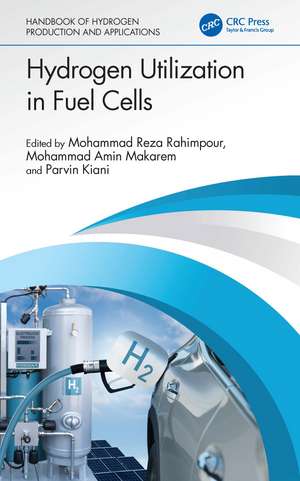Hydrogen Utilization in Fuel Cells
Editat de Mohammad Reza Rahimpour, Mohammad Amin Makarem, Parvin Kianien Limba Engleză Hardback – 6 noi 2024
- Introduces the electrochemistry and thermodynamics of fuel cells
- Provides an overview of fuel cells materials
- Discusses applications of fuel cells in transportation and energy systems
- Describes the role of hydrogen in various fuel cells
- Details the kinetics, performance, stability, and environmental challenges of fuel cells
Preț: 1010.70 lei
Preț vechi: 1232.56 lei
-18% Nou
Puncte Express: 1516
Preț estimativ în valută:
193.39€ • 202.46$ • 160.02£
193.39€ • 202.46$ • 160.02£
Carte tipărită la comandă
Livrare economică 08-22 aprilie
Preluare comenzi: 021 569.72.76
Specificații
ISBN-13: 9781032466156
ISBN-10: 1032466154
Pagini: 413
Ilustrații: 230
Dimensiuni: 156 x 234 mm
Greutate: 0.75 kg
Ediția:1
Editura: CRC Press
Colecția CRC Press
Locul publicării:Boca Raton, United States
ISBN-10: 1032466154
Pagini: 413
Ilustrații: 230
Dimensiuni: 156 x 234 mm
Greutate: 0.75 kg
Ediția:1
Editura: CRC Press
Colecția CRC Press
Locul publicării:Boca Raton, United States
Public țintă
PostgraduateCuprins
Section I: Introduction to Fuel Cells. 1. Fundamentals, Characteristics, and Applications of Fuel Cells. 2. The Electrochemistry and Thermodynamics of Fuel Cells. 3. Fuel Cell Comparison to Conventional Power Generation Technologies. 4. Characterization Methods for Fuel Cells Materials and Components. Section II: Fuel Cell Materials. 5. Fuel Cell Cathodic Materials and Catalysts. 6. Fuel Cell Electrolyte Materials. Section III: Role of Hydrogen in Fuel Cells and Applications. 7. Role of Hydrogen in Polymer Electrolyte Fuel Cell Systems. 8. Role of Hydrogen in Polymer Electrolyte Membrane Fuel Cells. 9. Role of Hydrogen in Proton Exchange Membrane Fuel Cell. 10. Role of Hydrogen in Phosphoric Acid Fuel Cells. 11. Role of Hydrogen in Solid Electrochemical Cell. 12. Role of Hydrogen in Direct Methanol Fuel Cells. 13. Role of Hydrogen in Zinc–Air Fuel Cells. 14. Application of Fuel Cells in Transportation.
Notă biografică
Mohammad Reza Rahimpour is a Distinguished Professor of Chemical Engineering at Shiraz University, Iran. He earned a PhD in chemical engineering at Shiraz University, in collaboration with the University of Sydney, Australia, in 1988. He leads a pioneering research group specializing in fuel processing technology, with a particular focus on the catalytic conversion of both fossil fuels, such as natural gas, and renewable fuels, like bio‑oils derived from lignin, into valuable energy sources. Throughout his academic career, Dr. Rahimpour has specialized in hydrogen production technologies, including steam methane reforming, water electrolysis, photocatalytic hydrogen production, and hydrogen production from both renewable sources and fossil fuels. His extensive expertise and innovative research significantly contribute to advancements in hydrogen production and its practical applications.
Mohammad Amin Makarem earned a PhD in chemical engineering at Shiraz University. His research interests include gas separation and purification, nanofluids, microfluidics, catalyst synthesis, reactor design, and green energy.
Parvin Kiani earned a degree in chemical engineering at Shiraz University. Her research has focused on gas separation, clean energy, and catalyst synthesis.
Mohammad Amin Makarem earned a PhD in chemical engineering at Shiraz University. His research interests include gas separation and purification, nanofluids, microfluidics, catalyst synthesis, reactor design, and green energy.
Parvin Kiani earned a degree in chemical engineering at Shiraz University. Her research has focused on gas separation, clean energy, and catalyst synthesis.
Descriere
Hydrogen Utilization in Fuel Cells introduces the fundamentals, characteristics, and applications of fuel cells, materials used, the role of hydrogen in different fuel cell types, and applications of fuel cells in transportation and small portable and stationary power systems.
